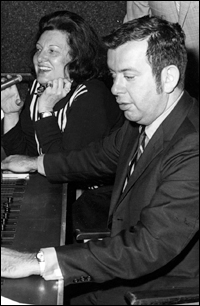
*
Revolutionaries don't often come in the form of a 40-something housewife with two kids and an accountant husband. But Florence Greenberg was no ordinary revolutionary and no ordinary woman. In the 1950s, when her peers were playing mahjong and baking, the white Greenberg discovered four black teenage girls singing in a playground, founded a record label and changed the face of pop music. Oh, and by the way, she also took a lover 18 years her junior.
"My mother was a fascinating, headstrong, diverse human being," says Stanley Greenberg. "She was [also] complicated. I hoped the show would convey this in a way that was not maudlin, and I believe they did that."
The show in question is Baby It's You!, written by Floyd Mutrux and Colin Escott (Million Dollar Quartet). The story of Florence Greenberg's assault on the all-male bastion of the pop recording industry, it also graphs the relationship between the Svengali-like Greenberg and the Shirelles, one of the most popular girl groups of the 1960s.
They were a million dollar quartet of another kind, climbing the charts with such hits as "Soldier Boy," "Will You Love Me Tomorrow," "Mama Said" and the title tune. These and other tracks make up the score of Baby It's You! Greenberg's love of adventure did not exactly come out of the blue. She had been a community and political activist and established a camp for the blind after her son Stanley was born with the affliction. "In all respects, she insisted that I live in a sighted world, that it not be in any way an excuse to make me less than what I was," says Stanley, who joined his mother as an executive at the three record companies she would eventually found.
Florence Greenberg practiced what she preached. Blessed with a passion for music, a good ear and keen instincts, she recognized the potential of four of her daughter Mary Jane's classmates — Shirley Alston, Beverly Lee, Doris Kenner and Addie "Micki" Harris — and in 1958 packaged them into The Shirelles. It was an especially fertile time for Greenberg to start knocking on the doors of the Brill Building, a pop music mecca. Elvis Presley was in the army, Buddy Holly had died, and Chuck Berry would soon find himself in jail. The music world was primed for change.
| |
 |
|
| Greenberg and son Stanley in the studio | ||
| Florence Greenberg Estate |
Greenberg's stable of stars would grow to include Dionne Warwick, Tammi Terrell, Chuck Jackson, B.J. Thomas and many others, creating hits that spoke of romantic yearnings and whispered prayers for the beloved. Despite her flinty business sense, Greenberg shared the sentiments of her singers. And to the dismay of her family, she extended that romanticism in an affair with Luther Dixon, an African-American record producer. "We weren't upset because of Luther's color," says her son, adding that his parents had no truck with racial differences. "We were upset that she was having an affair."
The relationship would eventually destroy her marriage. Greenberg made more than a few serious mistakes in her quest for fame. But she lived and died with few regrets.
Co-director Sheldon Epps says that Greenberg's theme song was likely one of her greatest hits, the Burt Bacharach–Dionne Warwick standard "Don't Make Me Over." "That song speaks to both her personal and professional life," he says. "When everybody was telling her, 'Don't do this,' 'You can't do this,' she was saying, 'Just watch me!'''
In fact, it was Greenberg's encounter with the then-fledgling composer Bacharach and his muse, Dionne Warwick, that led to the end of the affair with Dixon. She was savvy enough to realize that the duo represented a revolutionary new sound that she could ride to greater success — and did — with such hits as "Walk On By" and "I Say A Little Prayer." "Greenberg could be ruthless when it came to making tough decisions about the changing tastes in pop music, even if that left Luther behind," says Epps. "Her passion for music overrode her passion for the man."
Adds Beth Leavel, who won a Tony for The Drowsy Chaperone and plays Greenberg: "She was a true American original. How can you not love a woman driven by her passions, no matter the cost?... It's all about finding out who you really are in this life and how you can make your own unique contribution. Florence Greenberg knew she needed to make something of her life other than making chicken soup."










